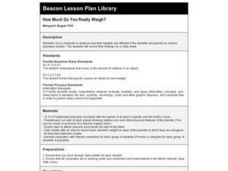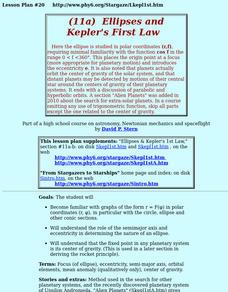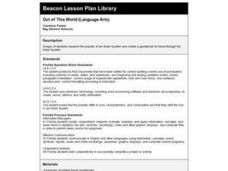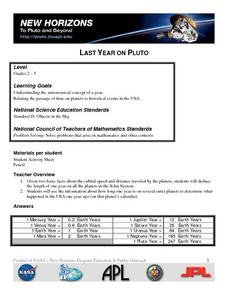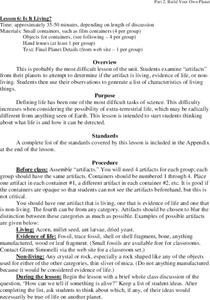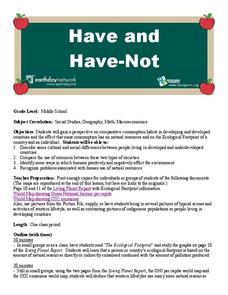Curated OER
How Much Do You Really Weigh?
Sixth graders check to see how their weights differ if they weighed themselves on different planets. They record their findings on a data sheet.
Curated OER
Rolling Through Space
Seventh graders use a foll of toilet paper to visualize the vast distance that separates the sun and the planets of our solar system.
Curated OER
The Discovery of the Solar System
Students explain the observed motion of the planets. The inner ones move back-and-forth across the position of the Sun, while the outer ones usually advance in one direction, but with occasional temporary reversals known as "retrograde...
Curated OER
Why is the Average Temperature Greater on Venus than on Mercury?
Students examine the reasons why the temperature is higher on Venus than on Mercury. In groups, they analzye both planet's atmospheres and determine the rate of global warming on each. They use the internet to research the planets in...
Curated OER
Ellipses And Kepler's First Law
Learners explain that planets actually orbit the center of gravity of the solar system, and that distant planets may be detected by motions of their central star around the centers of gravity of their planetary systems.
Curated OER
Out of This World (Language Arts)
Second graders, in groups, research the planets in the solar system and create a guidebook for travel.
Curated OER
Space Trader And Economics
Students' play a game applying different economic and game terms. In the game, the students' are to travel to 4 planets which provide the best resources for increasing their money to purchase a moon in the end. The students' keep track...
Curated OER
Extra Terrestial Excursions
Fourth graders determine how long it would take to fly to each of the planets in the solar system. They do two calculations: one, if they were using conventional jet, the other if they were using the fastest spacecraft possible.
Curated OER
Last Year on Pluto
Students examine the astronomical concept of a year. They relate the passage of time on planets to historical events in the USA.
Curated OER
Space Presents Problems
Students use the internet to research problems related to space. They complete a questionaire to direct their research before beginning. They create a database of moon and planet characteristics.
Curated OER
Observing Mars in the Night Sky
Students compare and contrast the orbits of Earth and Mars, locate the planet Mars, and diagram its retrograde motion.
Curated OER
Sea Secrets
Students study the following: For centuries, people have been challenged by the mysteries that lie beneath the blue depths of our ocean planet. Very little was known about the ocean until late in the nineteenth century, although nearly...
Curated OER
Out of This World
Students take a mission to Mars. In this space science lesson, students listen a lecture about space travel to Mars and the planet itself. Students then create timelines of exploration and write poetry about their ideal planet.
Curated OER
The Path of the Sun, the Ecliptic
High schoolers are introduced to the ecliptic, the zodiac and the apparent motions of the Sun, Moon and planets across the sky.
Curated OER
The Best of the Solar System - Planetary Research
Students increase their ability to recognize the planets and their surface features. In this exploratory activity students focus on details by studying uncaptioned images.
Curated OER
Gravity
Sixth graders explore the characteristics of gravity. They discuss gravity on Earth and then use cereal boxes to research and compare the weight of objects on Earth to the weight of those objects on other planets.
Curated OER
Water Quality
In this unit of lessons, 2nd graders examine the water quality of the water on the planet. They discover how much water is on the planet and how to conserve their water usage.
Curated OER
Is It Living?
Students investigate the definition of life and alive in the context of a unit that is involved with building their own planet. They participate in a class discussion about defining life, and in small groups analyze artifacts to...
Curated OER
Discovering a Law of Space Physics
Learners use data collected by an astronomer to determine the relationship between the time it takes the planet to orbit the sun and the average radius of the planet's orbit around the sun. Students use trial and error to find the...
Curated OER
Mars
First graders listen as the teacher reads a copy of the WEEKLY READER that talks about Mars and ask questions accordingly. They again listen as a section about Earth is read from the magazine. Now, the class orally compare and contrast...
Curated OER
Destination Mars!
Fifth graders view Mysteries of Earth & Mars Video on DVD and record thoughts in their online journal. They record data in a spreadsheet about each planet then form a theory of the best time to launch a space craft from Earth to land...
Curated OER
Let's Build a City In the Solar System
Sixth graders explore the solar system. Using the Internet, 6th graders gather information about planets in our solar system. Students participate in an activity to determine where they should build the first city in space. They create a...
Curated OER
Got Space?
Students explore our solar system of planets through research and activities. Using cooperative grouping and interaction, students gain an understanding of how the characteristics of the planets differ from one another.
Curated OER
Environment: The Haves and the Have Nots
Students examine consumption habits in developed and developing countries and determine their effects on natural resources. In groups, they assess graphs on the Living Planet Report and observe the connection between consumption and...


